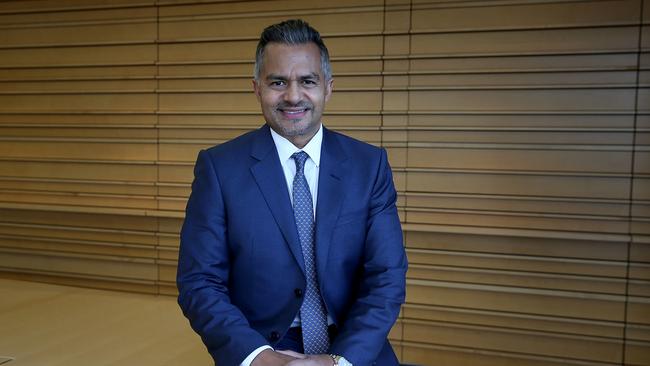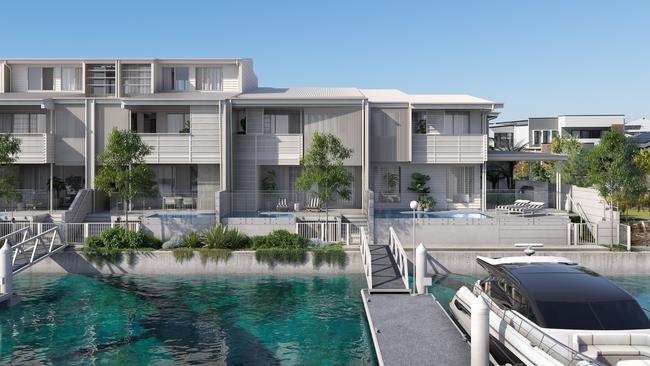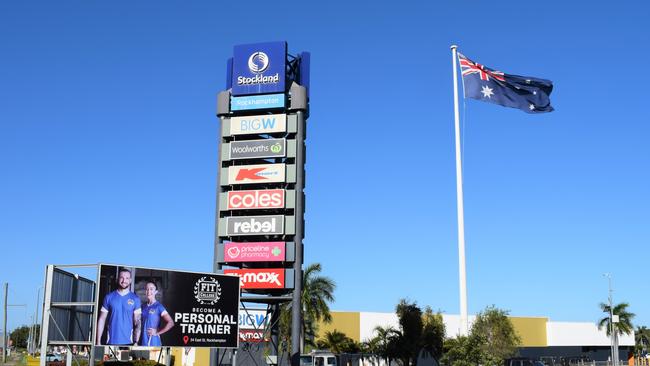Stockland is ramping up its pipeline of housing estate and land lease projects
Australia’s largest residential developer Stockland says it has weathered the housing storm and is gearing up for a surge in demand for its home estates and land lease projects.

Property developer Stockland said it was seeing early signs of improved market conditions as it ramps up its pipeline of projects for its housing estates and land lease business in anticipation of future demand.
Stockland managing director Tarun Gupta said that in a busy first half, marked by the company leading a venture to acquire $1.06bn of housing projects from Lendlease, Stockland had reshaped its portfolio.
“In the last 12 to 18 months there have been uncertain market conditions with weather, costs and builder supply chain issues and we’ve been navigating that really well,” he said. Now it is seeing signs of better times.
“Over the half and into the new year we’ve seen some early signs of improvement,” he said. “We’ve seen costs rising at more normalised levels and our customers can get into their homes now in seven months after [that] having blown out to 12.”
Mr Gupta said Stockland had positioned its housing and land lease businesses to meet future demand. “By the end of the 2024 financial year, we expect to be actively trading from 66 communities projects ... up from 36 communities,” he said.
Stockland reported a statutory profit of $102m in the first half, down on the $301m in the same six months last year. Its pre-and post-tax Funds From Operations in the half was $266m, against $353m in the first half of last year, which reflected the “material skew” in housing estate settlement volumes to the second half of this financial year.
Mr Gupta said that reflected the impact of rain and floods on construction and “there was “nothing we could do about it”.
“We have a lot of settlements in the second half and they will come through in April, May and June which has come through in our guidance,” he said.

Stockland said while “current market conditions remain uncertain” it kept its FFO per security guidance at a range of 34.5c to 35.5c on a pre-tax basis, with tax expense expected to be a high single-digit percentage of pre-tax FFO.
The distribution per security is expected to be within Stockland’s targeted payout ratio of 75 per cent to 85 per cent of post-tax FFO.
A distribution of 8c per security was declared on Wednesday.
Stockland shares closed steady at $4.61 each.
In the half, there were 1614 housing settlements against 1872 in the first half last year, with an 18 per cent development operating profit margin, reflecting mix shifts and a larger skew to the second half this year.
The housing unit had net sales of 2172 lots over the half, up on 1804 lots this time last year, with sales rates improving through the period. Inquiry levels reflected a similar quarter-on-quarter improvement.
Stockland’s acquisition of 12 actively trading housing projects from Lendlease in partnership with its Thai capital partner Supalai should settle by the middle of the year.
Mr Gupta said the purchase will in the future provide attractive returns and new sources of recurring income and potentially 2500-plus settlements a year.
“We expect the transaction to be accretive to our FFO per security from fiscal 2025,” he said.
Stockland said its commercial property segment delivered FFO of $329m in the half, up by 3 per cent compared to the previous corresponding period.

This reflected strong comparable growth of 3.1 from the $10.6bn commercial property portfolio, driven by positive leasing spreads across the logistics and retail portfolio, and ongoing contributions from development and management income.
Almost 70 per cent of the commercial property portfolio was independently revalued over the half, with a $51m decrease on previous book values which reflected the softer capitalisation rate environment.
Stockland’s $3.7bn logistics portfolio was the stand-out area and it is advancing its $6.5bn pipeline in the sector.
“We pivoted to logistics in the last couple of years and its been a good move for us with a lack of supply, population growth and the move out of bricks and mortar, and we’ve enjoyed good results there,” Mr Gupta said.
Stockland’s $1.9bn ofices delivered FFO of $57m for the half, up 6.9 per cent on the first half of last year. The valuation of its offices declined by $79m, or 4.1 per cent. The retail portfolio bumped up FFO by 0.9 per cent to $187m.
Broker Citi said Stockland’s first-half results were broadly in-line guidance and noted that residential sales and inquiry was improving.








To join the conversation, please log in. Don't have an account? Register
Join the conversation, you are commenting as Logout